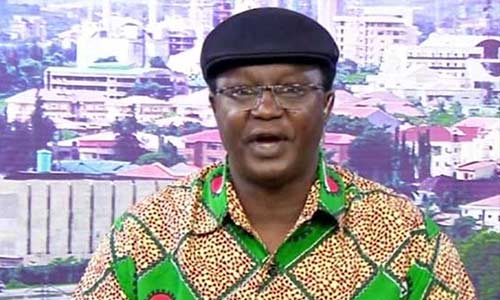NEWS UPDATES 13/01/2022
NLC Berates Bill Seeking Prohibition Of Health Workers’ Strike

The Nigeria Labour Congress (NLC) has stated that it will begin engagement processes to ensure that the proposed bill by a member of the House of Representatives seeking to prohibit strikes by health workers in the employment of the three tiers of government is dropped.
The bill titled: “An Act to amend the Trade Disputes Act cap T8, Laws of the Federation of Nigeria 2004 to prohibit medical practitioners in the employment of Federal, State and local governments (as employees in the essential service sector) from embarking on strike and to accelerate administrative and Judicial proceedings in the determination of Trade Disputes involving them and related matters,” is sponsored by House of Representatives member, Simon Chukwuemeka Atigwe (PDP, Enugu).
The NLC stressed that the bill is an infringement on the fundamental rights of the Nigerian workers to engage in strikes as their last resort to demand their wages and other entitlements, as enshrined in the conventions and treaties of the International Labour Organizations (ILO), of which Nigeria is a member. It further stated that instead of dissipating energies on the bill, lawmakers can begin to seek creative ways to reduce rife poverty in the country.
The President of the NLC and the International Trade Union Confederation, Comrade Ayuba Wabba, who made this known during a briefing in Abuja, said the NLC will engage the House of Representatives to enlighten them about the extant ILO laws and how it relates to the Nigerian workers, particularly health workers. “The issue of labour generally in all jurisdictions is actually regulated by the International Labour Organization (ILO), through conventions and treaties and, particularly the issue of industrial relations, and in particular the issue of strike in any of the sectors of the economy.
“One of the fundamentals of the ILO, particularly in the Freedom of Association document, is part of the decisions of the ILO, of which Nigeria is a member country. In that provision, particularly item 17, it states clearly that where national laws violate the principle of association, including those interpreted by High Courts, the ILO Committee has always considered it within its mandate to examine those laws, provide guidelines and even offer ILO technical assistance to bring laws into compliance with the principles of freedom of association as set out in the constitution of the ILO.
“In this particular document, particularly compilation 751, it states clearly that the right of workers to strike constitute a fundamental right of workers and their organizations, especially Unions, and it is used as a means of defending the economic and social rights and interests of those workers. A strike aimed at increase in wages and payment of wage arrears clearly falls within the scope of the legitimacy of the Union activities. This is compilation 769.
“And importantly on the issue of essential services, by the ILO global standard, only air transport/traffic controllers are assumed strictly in its sense as essential service. That is why the word ‘may’ has been used in other sectors, particularly the health sector. Therefore, no sector can exclusively be said to be essential service outside the air traffic control.
“If you come and say you want to put a law in place to prohibit strikes in the health sector, it is laughable. You cannot tie the workers’ hands not to demand their rights because strike is not a tea party but a last resort. Also, where industrial relations is working optimally, strikes can be avoided. This is the provision of law. I am sure those that are actually proposing the bill may not be aware of the provisions of those laws. The laws are very explicit.
“In fact, law says ‘may’. So only the case of air traffic control is strictly in the sense of it being essential. But all other sectors may, depending on the circumstance. What is the global practice is that if there are strikes in those establishments, there is also a provision for you to negotiate services that can be rendered, and that has been done over time. Clearly, it is a misplaced priority. For any legislator without the requisite knowledge of the global standard set by ILO to come and propose a law, you can make a law that also possibly in its application may be difficult because you cannot tie the hand of the worker where his economic and social rights are being impinged upon, especially when he is not paid.”
Concerning steps the NLC will take to ensure that the bill is stopped, Wabba added that he will personally be at the public hearing. “Outside the public hearing, I will also try to look at who is actually the proponent of the particular bill, and whether they are aware of this provision and global standards. I am going to engage with the law makers, peradventure they are not aware of the principle that says: even if you make laws, if that law infringes on the right of the worker, the ILO will always call on the Government and the relevant authorities to review the law to conform to the principles of the freedom of association.
“We will engage the lawmakers to see if they will be honourable to respect the rights of workers. I am also sure that the Federal Ministry of Labour will be able to guide the lawmakers. We have levels of engagement: first, we are going to engage them in a very coherent manner; second, we know that if such bills are actually promulgated, the President can also decline assent if they contravene the provision of an international legislation.
“We will take the campaign to their doorsteps and constituencies. We don’t want to get to the level of naming and shaming them at their constituency level. There are many things the law makers can do for Nigerians, not to undermine the rights of workers. There is poverty everywhere and it is a threat to prosperity everywhere. I think there are many things they ought to have focused their attention on and not this one that is about fundamental principles that ought to be respected.
“If you have a provision of ‘nowork, no pay’, then you should also have the provision of ‘no pay, no work.’ People just assume that the worker is a slave and doesn’t have rights. Every worker has a right provided in the ILO status. In fact, the law I read is that even when the National Assembly makes laws, and those laws are contrary to the provision of the principles of association, the ILO has always requested the Government to amend those laws to conform with the principles of association. In this particular instance, this is actually the standard, and is not limited to Nigeria.
“Under a democratic government, these conventions were ratified by Nigeria as a member country of the ILO, and they are in practice and in our body of laws. It is therefore laughable for anybody to think otherwise. It is only in rare circumstances that the health sector in its entirety will actually go on strike. There are provisions for mediation, conciliation and arbitration.”



